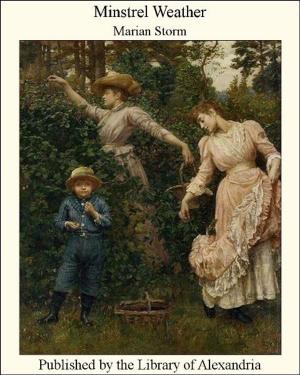Bertha's Christmas Vision: An Autumn Sheaf
Nonfiction, Religion & Spirituality, New Age, History, Fiction & Literature| Author: | Horatio Alger | ISBN: | 9781465617996 |
| Publisher: | Library of Alexandria | Publication: | March 8, 2015 |
| Imprint: | Language: | English |
| Author: | Horatio Alger |
| ISBN: | 9781465617996 |
| Publisher: | Library of Alexandria |
| Publication: | March 8, 2015 |
| Imprint: | |
| Language: | English |
Of all the houses which Martin Kendrick owned, he used the oldest and meanest for his own habitation. It was an old tumble-down building, on a narrow street, which had already lived out more than its appointed term of service, and was no longer fit to “cumber the ground.” But the owner still clung to it, the more, perhaps, because, as it stood there in its desolation, unsightly and weather-beaten, it was no unfit emblem of himself. Martin the miser! Years of voluntary privation, such as in most cases follow only in the train of the extremest penury, had given him a claim to the appellation. It might be somewhat inconsistent with his natural character, that, with the exception of the one room which he occupied, the remainder of the large house was left tenantless. After all, it was not so difficult to account for. He could not bear the idea of having immediate neighbors. Who knows but they might seize the opportunity afforded by his absence, and rob him of the gains of many years, which, distrusting banks and other places of deposit, he kept in a strong box under his own immediate charge? Martin had not always been a miser. No one ever becomes so at once; though doubtless the propensity to it is stronger in some than in others. Years ago,—so many that at this time the recollection only came to him dimly, like the faint sound of an almost-forgotten tune,—years ago, when the blood of youth poured its impetuous current through his veins, he married a fair girl, whose life he had shortened by his dissipated habits; and the indifference, and even cruelty, to which they led. The day of his wife’s death, the last remnant of the property which he inherited from his father escaped from his grasp. These two events, either of which brought its own sorrow, completely sobered him. The abject condition to which he had reduced himself was brought vividly to his mind; and he formed a sudden resolution,—rushing, as will sometimes happen, from one extreme to the other,—that, as prodigal as his past life had been, that which succeeded should be sparing and penurious in the same degree; until, at least, he had recovered his losses, and, so far as fortune went, was restored to the same position which he had occupied at the commencement of his career. But it is not for man to say, “Thus far shalt thou go, and no farther,”—to give himself up, body and soul, to one engrossing pursuit, and, at the end of a limited time, wean himself from it. Habit grows by what it feeds on. It was not long before the passion of acquisition acquired a controlling influence over the mind of Martin Kendrick. He reached the point which he had prescribed for himself; but it stayed him not. Every day his privations, self-imposed though they were, became more pinching, his craving for gold more insatiable. Long ago, he had cut himself off from all friendship,—all the pleasures and amenities of social intercourse. He made no visits, save to his tenants, and those only on quarter-day. Nor were these of an agreeable character to those favored with them; for Martin was not a merciful landlord. He invariably demanded the uttermost farthing that was due; and neither sickness nor lack of employment had the power for a moment to soften his heart, or delay the execution of his purpose. His mind was drawn into itself, and, like an uncultivated field, was left to all the barrenness of desolation. Such is always the case, when a man, by his own act, shuts himself out from his kind, foregoes their sympathy and kind offices, and virtually says, “I am sufficient unto myself.”
Of all the houses which Martin Kendrick owned, he used the oldest and meanest for his own habitation. It was an old tumble-down building, on a narrow street, which had already lived out more than its appointed term of service, and was no longer fit to “cumber the ground.” But the owner still clung to it, the more, perhaps, because, as it stood there in its desolation, unsightly and weather-beaten, it was no unfit emblem of himself. Martin the miser! Years of voluntary privation, such as in most cases follow only in the train of the extremest penury, had given him a claim to the appellation. It might be somewhat inconsistent with his natural character, that, with the exception of the one room which he occupied, the remainder of the large house was left tenantless. After all, it was not so difficult to account for. He could not bear the idea of having immediate neighbors. Who knows but they might seize the opportunity afforded by his absence, and rob him of the gains of many years, which, distrusting banks and other places of deposit, he kept in a strong box under his own immediate charge? Martin had not always been a miser. No one ever becomes so at once; though doubtless the propensity to it is stronger in some than in others. Years ago,—so many that at this time the recollection only came to him dimly, like the faint sound of an almost-forgotten tune,—years ago, when the blood of youth poured its impetuous current through his veins, he married a fair girl, whose life he had shortened by his dissipated habits; and the indifference, and even cruelty, to which they led. The day of his wife’s death, the last remnant of the property which he inherited from his father escaped from his grasp. These two events, either of which brought its own sorrow, completely sobered him. The abject condition to which he had reduced himself was brought vividly to his mind; and he formed a sudden resolution,—rushing, as will sometimes happen, from one extreme to the other,—that, as prodigal as his past life had been, that which succeeded should be sparing and penurious in the same degree; until, at least, he had recovered his losses, and, so far as fortune went, was restored to the same position which he had occupied at the commencement of his career. But it is not for man to say, “Thus far shalt thou go, and no farther,”—to give himself up, body and soul, to one engrossing pursuit, and, at the end of a limited time, wean himself from it. Habit grows by what it feeds on. It was not long before the passion of acquisition acquired a controlling influence over the mind of Martin Kendrick. He reached the point which he had prescribed for himself; but it stayed him not. Every day his privations, self-imposed though they were, became more pinching, his craving for gold more insatiable. Long ago, he had cut himself off from all friendship,—all the pleasures and amenities of social intercourse. He made no visits, save to his tenants, and those only on quarter-day. Nor were these of an agreeable character to those favored with them; for Martin was not a merciful landlord. He invariably demanded the uttermost farthing that was due; and neither sickness nor lack of employment had the power for a moment to soften his heart, or delay the execution of his purpose. His mind was drawn into itself, and, like an uncultivated field, was left to all the barrenness of desolation. Such is always the case, when a man, by his own act, shuts himself out from his kind, foregoes their sympathy and kind offices, and virtually says, “I am sufficient unto myself.”















